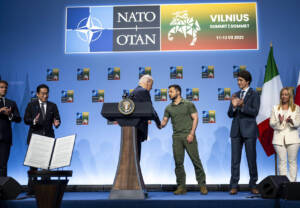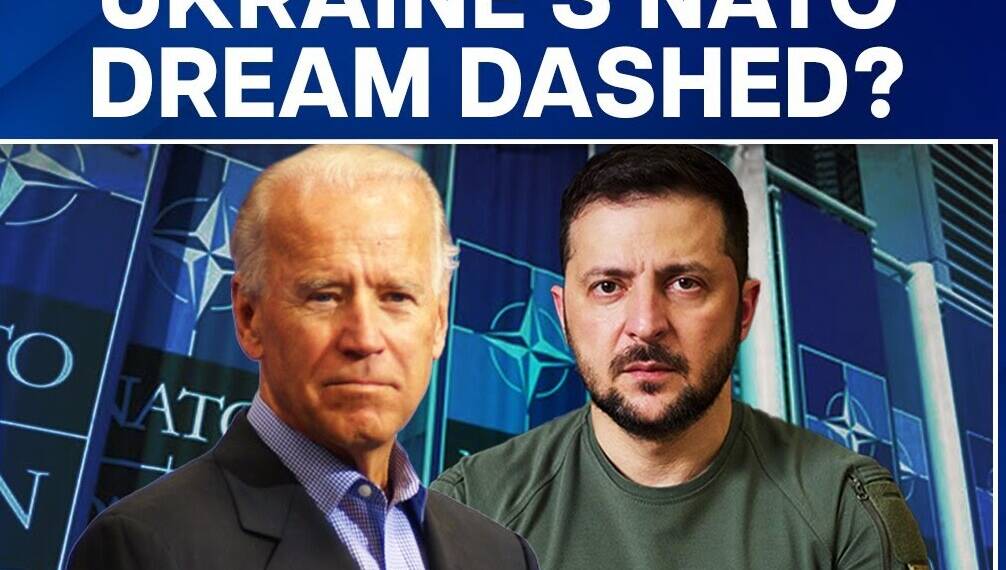The United States and Germany are hesitant to support Ukraine’s NATO membership, as disclosed by Foreign Policy (FP) magazine. The primary concern revolves around the potential escalation of tensions with Moscow if Kiev is admitted into the alliance. This resistance from Washington and Berlin is contrary to the desires of some other NATO members, who advocate for Ukraine’s inclusion in the bloc.
The apprehension is rooted in the fear that such a move might lead to a broader and more intense conflict with Russia. This opposition from key NATO members is expected to be a focal point of discussion at an upcoming major summit later this year.
Join us on Telegram: https://t.me/tfiglobal
According to a report by an American magazine, which cites twelve current and former officials, there is a concerted effort from Kiev and its staunch supporters, including Poland and the Baltic states, to advocate for Ukraine’s inclusion in the US-led NATO bloc. The push for Ukraine’s acceptance into the alliance is set to be a focal point at a significant summit scheduled for July in Washington, DC.

Proponents of expediting Ukraine’s NATO membership contend that only full-fledged inclusion in the alliance could compel Russia to bring an end to the ongoing conflict. They argue that such a move would be more cost-effective in the long term compared to continually supplying arms. This perspective is maintained despite Russia’s consistent assertion of readiness for peace talks.
The United States and Germany, primary contributors of military aid to Ukraine, hold a differing stance on the country’s NATO membership. Officials from both nations argue that, although eventual inclusion is warranted, the current moment is not opportune. Instead, they propose a focus on supplying Ukraine with weapons.
Read More: Kremlin Reacts to NATO’s ‘Military Schengen’ Proposal
It is reported that the apprehension stems from the belief that admitting Ukraine into NATO during its conflict with Russia may lead to a significant confrontation. This concern is grounded in Article 5 of the alliance’s treaty, asserting that an attack on one member is an attack on all. Such a scenario could trigger a full-scale clash between NATO and Moscow.
This standoff is further complicated by the opposition of certain EU members, Hungary and Slovakia among them, to providing arms to Ukraine. Hungarian Prime Minister Viktor Orban expresses concern that Ukraine’s NATO membership might draw the alliance into the ongoing conflict. Similarly, Slovak Prime Minister Robert Fico warns that such a move could potentially escalate into a global conflict.
The United States has advised European Union (EU) members against raising the issue of Ukraine’s NATO membership at the upcoming summit. The rationale behind this recommendation is rooted in the concern that bringing up the topic could reveal internal divisions within the alliance.
Moscow has consistently cautioned Western nations against supplying military aid to Ukraine, contending that such assistance would only protract the ongoing conflict. Russian President Vladimir Putin has explicitly linked Kiev’s aspiration to join NATO, a strategic objective enshrined in its constitution in 2019, as a key factor contributing to the current conflict.
Read More: Trump’s NATO jibe is a 100% correct and 200% effective
The initial assistance provided by the United States and Germany to Ukraine did not lead to a cessation of the ongoing conflict; rather, it appears that their involvement has not been sustained to address Ukraine’s ongoing challenges. Following the fulfillment of their immediate interests, there seems to be a diminishing commitment to supporting Ukraine. Consequently, it can be inferred that the United States and Germany are now hindering Ukraine’s aspirations to join NATO.








